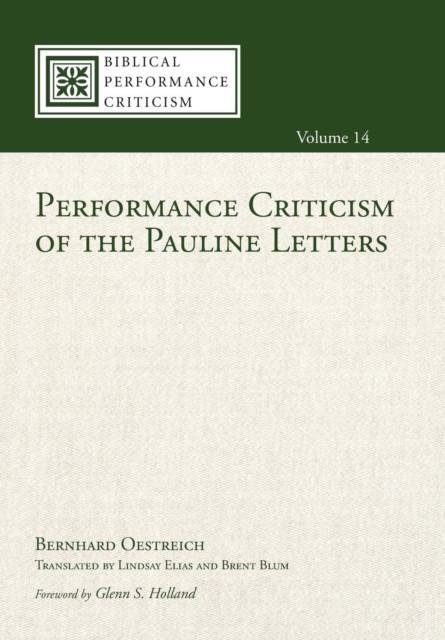
- Afhalen na 1 uur in een winkel met voorraad
- Gratis thuislevering in België vanaf € 30
- Ruim aanbod met 7 miljoen producten
- Afhalen na 1 uur in een winkel met voorraad
- Gratis thuislevering in België vanaf € 30
- Ruim aanbod met 7 miljoen producten
Zoeken
Omschrijving
Receiving a letter from Paul was a major event in the early churches. Given the orally oriented culture of the time, a letter was designed to be read out loud in front of an audience. The document was an intermediate state for the local transport of the message, but the actual medium of communication was the performance event. This event was embedded in the written text in a manner comparable to a theater script. After careful preparation because of high expectations from ancient audiences, a presenter embodied the message with his voice, gazes, and gestures and made it not only understood but jointly experienced. After presenting a short history of performance criticism, this book clarifies what is meant by the highly ambiguous term "performance" and develops steps to analyze ancient texts in order to find and understand the embedded signals of performance. This leads to a critical assessment of the potential of performance criticism as a method. Then, the method is applied to the Pauline Epistles and other early Christian letters. It proves to be highly rewarding: difficult passages become comprehensible, new aspects come to light, the text's impact on the audience is felt--in short, the texts come alive.
Specificaties
Betrokkenen
- Auteur(s):
- Vertaler(s):
- Uitgeverij:
Inhoud
- Aantal bladzijden:
- 366
- Taal:
- Engels
- Reeks:
- Reeksnummer:
- nr. 14
Eigenschappen
- Productcode (EAN):
- 9781498248853
- Verschijningsdatum:
- 28/10/2016
- Uitvoering:
- Hardcover
- Formaat:
- Genaaid
- Afmetingen:
- 152 mm x 229 mm
- Gewicht:
- 689 g

Alleen bij Standaard Boekhandel
+ 156 punten op je klantenkaart van Standaard Boekhandel
Beoordelingen
We publiceren alleen reviews die voldoen aan de voorwaarden voor reviews. Bekijk onze voorwaarden voor reviews.











